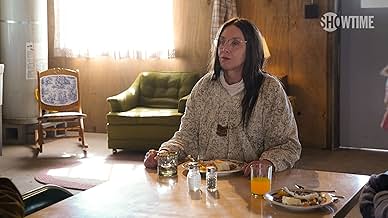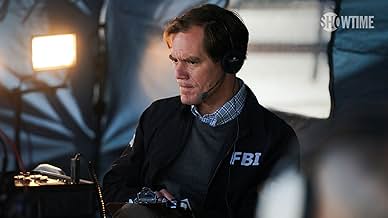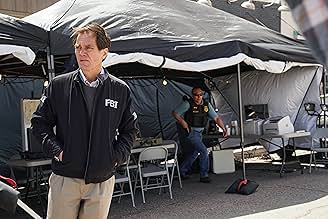Ein Ereignis, das die amerikanische Milizbewegung aufrüttelte und zur Radikalisierung von Timothy McVeigh und Terry Nichols beitrug.Ein Ereignis, das die amerikanische Milizbewegung aufrüttelte und zur Radikalisierung von Timothy McVeigh und Terry Nichols beitrug.Ein Ereignis, das die amerikanische Milizbewegung aufrüttelte und zur Radikalisierung von Timothy McVeigh und Terry Nichols beitrug.
Folgen durchsuchen
Empfohlene Bewertungen
I knew about Waco but never paid attention to the mind-blowing information that came to light afterward.
I thought this series did a fantastic job of explaining the views of all sides. Waco and Waco: The Aftermath should be mandatory viewing for high schoolers.
As someone else said, the self-serving rules Karesh made re. Sex could have been covered more thoroughly. Karesh made a rule against anyone else having sex, even married couples. But he was allowed to have sex and impregnate even very young girls. That situation did warrant government intervention.
As the series explained, the ATF and the FBI used competing tactics to extract the members. The results were tragic.
I thought the actors were all well cast and they did a great job. There were many facets to this story, but it was all easy to follow.
I think the show is a perfect example of how to shed light on how our government and courts really work.
I thought this series did a fantastic job of explaining the views of all sides. Waco and Waco: The Aftermath should be mandatory viewing for high schoolers.
As someone else said, the self-serving rules Karesh made re. Sex could have been covered more thoroughly. Karesh made a rule against anyone else having sex, even married couples. But he was allowed to have sex and impregnate even very young girls. That situation did warrant government intervention.
As the series explained, the ATF and the FBI used competing tactics to extract the members. The results were tragic.
I thought the actors were all well cast and they did a great job. There were many facets to this story, but it was all easy to follow.
I think the show is a perfect example of how to shed light on how our government and courts really work.
Short answer would be, it's a great story. The actors were good, i believe the story was fair, and I can't wait for more shows like this one.
As someone who is neither American nor Christian, and I'm not even white! :p so i can honestly say I have no horse in this race, and yet i watched this series and the prequel twice! That's how good this is
As for the story, it was really deep, and it made me ask myself lots of questions! Questions that I perhaps wouldn't have thought of, had it not been for this show. For example, even though koresh was a false prophet, was it really OK to judge,punish and/or kill his followers, for believing his false prophecies? His prophecies about the events at waco weren't even wrong! It's just that he was lying about being the messiah,I believe. Is it wrong to lie to people about god? Yes, but then again, there were hundreds of religions throughout our history, and many of those religions are proven to be false and/or wrong! Which means there were people who lied to their followers about talking to some god, long before koresh thought of the idea! Do we treat all those believers, some of them still living among us today, and believing in their ancestor's mythologies, as cultist or terrorists? No we don't. How many of today's religions and branches of religions or ideologies, are going to be remembered as BS in tomorrow's history books? Does that mean we should prosecute the people who bought them? I believe not. So with that piece of advice, I invite you to watch/rewatch this mini series,and judge for yourself, who was right? Guns or no guns, the ATF had no rights to invade and kill all those people in their home, without any provocations.
As someone who is neither American nor Christian, and I'm not even white! :p so i can honestly say I have no horse in this race, and yet i watched this series and the prequel twice! That's how good this is
As for the story, it was really deep, and it made me ask myself lots of questions! Questions that I perhaps wouldn't have thought of, had it not been for this show. For example, even though koresh was a false prophet, was it really OK to judge,punish and/or kill his followers, for believing his false prophecies? His prophecies about the events at waco weren't even wrong! It's just that he was lying about being the messiah,I believe. Is it wrong to lie to people about god? Yes, but then again, there were hundreds of religions throughout our history, and many of those religions are proven to be false and/or wrong! Which means there were people who lied to their followers about talking to some god, long before koresh thought of the idea! Do we treat all those believers, some of them still living among us today, and believing in their ancestor's mythologies, as cultist or terrorists? No we don't. How many of today's religions and branches of religions or ideologies, are going to be remembered as BS in tomorrow's history books? Does that mean we should prosecute the people who bought them? I believe not. So with that piece of advice, I invite you to watch/rewatch this mini series,and judge for yourself, who was right? Guns or no guns, the ATF had no rights to invade and kill all those people in their home, without any provocations.
As with other films/shows regarding sensible topics, I would like to start by saying that I'm not from the U. S., just so you know this review has no bias whatsoever. I also want to point out that I had no knowledge of what happened in Waco before watching the first part of this series (Waco - 2018), and that this is now all the "knowledge" I have about it. So I can't speak for the historical accuracy.
What I can speak about is the entertainment value of this series, which in my opinion is the whole point. I mean, if you are looking for accuracy, you better watch a documentary. And as an entertainment product this was very good. It felt gripping from start to finish, the same way the first part was. Good performances all around, good dialogues, nice pacing, and even courtroom drama.
If you enjoyed the first part you will surely enjoy this.
What I can speak about is the entertainment value of this series, which in my opinion is the whole point. I mean, if you are looking for accuracy, you better watch a documentary. And as an entertainment product this was very good. It felt gripping from start to finish, the same way the first part was. Good performances all around, good dialogues, nice pacing, and even courtroom drama.
If you enjoyed the first part you will surely enjoy this.
There's certain things that I like and quite a few that I don't about this production. I've never been a big fan of chronological mayhem, when the timeline is bouncing erratically all over the place just like this was. It is a trick used by many of these miniseries to help stretch a two hour movie story into 20 hours of streaming service boredom.
Although this was actually a good script if it was presented chronologically consistent, the use of Giovanni Ribisi in a main role was the huge mistake. I have commented about his acting... or should I say lack of acting ability on other productions. But this one... he was so miscast it was just annoying. His thin voice and mumbling just makes it too hard to watch.
Once again, thank VLC for the ability to watch this in a player that allows 2.0 times the speed which definitely sped up not only the time to watch it, but the story pace reducing this to what it should've been.... a two hour movie.
Although this was actually a good script if it was presented chronologically consistent, the use of Giovanni Ribisi in a main role was the huge mistake. I have commented about his acting... or should I say lack of acting ability on other productions. But this one... he was so miscast it was just annoying. His thin voice and mumbling just makes it too hard to watch.
Once again, thank VLC for the ability to watch this in a player that allows 2.0 times the speed which definitely sped up not only the time to watch it, but the story pace reducing this to what it should've been.... a two hour movie.
I didn't realize this series was in connection with 2018's mostly forgettable "Waco". I found "Aftermath" much more intriguing.
Serving as both a prequel and sequel to "Waco", it tells parts of the story that are less known and which might raise more difficult (and sadly relevant) questions than the story of the actual raid and stand-off can, at least for anyone who's already familiar with the story. Unfortunately, the creators don't want to get messy enough to fully wrestle with the bigger questions it almost raises.
The strongest part of the series is the courtroom drama conspiracy trial of surviving Koresh followers. Ribisi, a perennially underappreciated actor, offers the most compelling portrayal in the series as the survivors' defense attorney. As a reported scientologist in real life, it's a little ironic that Ribisi's character is at times both defensive and accusatory of his clients regarding their blind devotion to Koresh as a cult leader.
The prequel portion of the series, the Koresh origin story, is pretty hokey. Brief snippets from "Waco" and Taylor Kitsch's portrayal of Koresh (whose performance was one of that series's strengths) only further expose the weaknesses of Keean Johnson's immature performance. And asking the audience to believe that Johnson somehow physically transformed into Kitsch in only a few short years is a pretty big ask.
But Michael Shannon, reprising his role as FBI agent Gary Noesner, is surprisingly one of the weakest links of the series. He seems to be mostly sleepwalking through this one. Maybe his character is tired from all the sleepless nights after his involvement at Waco? Whatever the case, it doesn't really work here and his scenes tend to drag the story down.
As for the McVeigh/Nichols interjections, they're thematically and historically important as far as the fallout of Waco is concerned, but they often feel like afterthoughts instead of aftermath.
The series tries its hardest to humanize everyone involved-perhaps even those who arguably don't deserve to be humanized-in order to show that labeling enemies as "evil" only leads to more violence and destruction. Fair enough. But it's a little too neat to reduce the lessons of Waco to "can't we all just get along?"
Serving as both a prequel and sequel to "Waco", it tells parts of the story that are less known and which might raise more difficult (and sadly relevant) questions than the story of the actual raid and stand-off can, at least for anyone who's already familiar with the story. Unfortunately, the creators don't want to get messy enough to fully wrestle with the bigger questions it almost raises.
The strongest part of the series is the courtroom drama conspiracy trial of surviving Koresh followers. Ribisi, a perennially underappreciated actor, offers the most compelling portrayal in the series as the survivors' defense attorney. As a reported scientologist in real life, it's a little ironic that Ribisi's character is at times both defensive and accusatory of his clients regarding their blind devotion to Koresh as a cult leader.
The prequel portion of the series, the Koresh origin story, is pretty hokey. Brief snippets from "Waco" and Taylor Kitsch's portrayal of Koresh (whose performance was one of that series's strengths) only further expose the weaknesses of Keean Johnson's immature performance. And asking the audience to believe that Johnson somehow physically transformed into Kitsch in only a few short years is a pretty big ask.
But Michael Shannon, reprising his role as FBI agent Gary Noesner, is surprisingly one of the weakest links of the series. He seems to be mostly sleepwalking through this one. Maybe his character is tired from all the sleepless nights after his involvement at Waco? Whatever the case, it doesn't really work here and his scenes tend to drag the story down.
As for the McVeigh/Nichols interjections, they're thematically and historically important as far as the fallout of Waco is concerned, but they often feel like afterthoughts instead of aftermath.
The series tries its hardest to humanize everyone involved-perhaps even those who arguably don't deserve to be humanized-in order to show that labeling enemies as "evil" only leads to more violence and destruction. Fair enough. But it's a little too neat to reduce the lessons of Waco to "can't we all just get along?"
Wusstest du schon
- WissenswertesThere were originally six episodes written and filmed, but it was condensed down to five in post-production.
- PatzerTimothy McVeigh is shown driving a yellow Mercury Grand Marquis during the months he was planning the OK City bombing. He did not own that car until April 14, 5 days before the bombing. He was forced to buy it in Kansas when his other car blew a head gasket.
- VerbindungenFollows Waco (2018)
Top-Auswahl
Melde dich zum Bewerten an und greife auf die Watchlist für personalisierte Empfehlungen zu.
- How many seasons does Waco: The Aftermath have?Powered by Alexa
Details
- Erscheinungsdatum
- Herkunftsland
- Offizieller Standort
- Sprache
- Auch bekannt als
- Уэйко: Последствия
- Produktionsfirmen
- Weitere beteiligte Unternehmen bei IMDbPro anzeigen
- Laufzeit
- 50 Min.
- Farbe
- Sound-Mix
- Seitenverhältnis
- 2.00 : 1
Zu dieser Seite beitragen
Bearbeitung vorschlagen oder fehlenden Inhalt hinzufügen










































